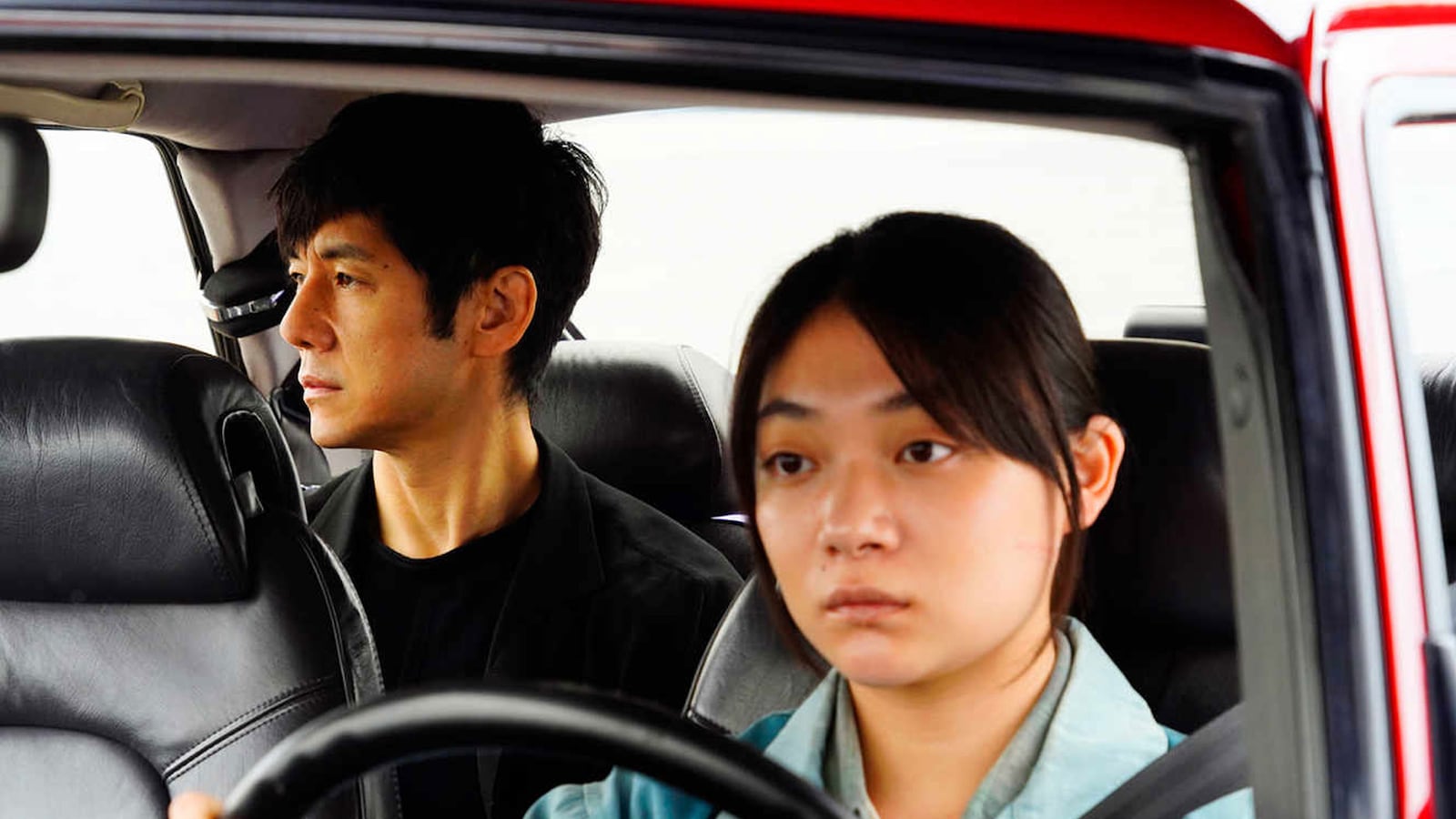A three-hour Japanese import about grief, art, and the solace derived from spending time behind the wheel, Drive My Car might not be an easy commercial sell here in the States. Nonetheless, it casts a spell like few other 2021 films.
Acclaimed auteur Ryusuke Hamaguchi’s second feature in as many months (following October’s superb Wheel of Fortune and Fantasy) revels in mysteries of the heart, which plague its protagonists as they try to reckon with fraught pasts about which they feel intense guilt. The story of a theater director who endures a tragedy and then attempts to process it via a new production of Uncle Vanya, this adaptation of author Haruki Murakami’s short of the same name is a sly and beguiling work about how drama allows us to express that which we can’t (or are afraid to) overtly articulate. Uninterested in concrete answers, it depicts—and poses—challenging questions as a means of locating deeper inner truths.
Japan’s entry for the 94th Academy Awards, and winner of numerous international festival awards, Drive My Car (Nov. 24, in theaters) concerns Kafuku (Hidetoshi Nishijima), a celebrated Tokyo actor and director whose relationship with his screenwriter wife Oto (Reika Kirishima) is at once close and strange, what with it rooted in Oto’s habit of concocting tales during sex, and then having Kafuku retell them to her in the morning, when her memory is fuzzy. Theirs is a bond predicated on back-and-forth storytelling, and Oto’s latest narrative—about a young woman who breaks into her high school sweetheart’s home in order to take and leave tokens for him, and whom Oto equates to a lamprey—quickly comes across as a metaphorical tale about her own complex rapport with her spouse. Oto’s fictional yarn suggests peculiar underlying marital discord, and that impression is exacerbated when Kafuku has a flight delayed, returns home to find Oto in the arms of another man, and silently departs before he’s noticed, never to address the issue with his wife.
Like us, Kafuku assumes that Oto’s lover is Koshi (Masaki Okada), a well-known actor signed to her upcoming TV venture, but as with the particulars of his and Oto’s conjugal arrangement, Drive My Car maintains just enough obliqueness to tantalize. What is evident are the many parallels between Kafuku’s circumstances and those found in Uncle Vanya, which he’s preparing to star in by running lines in his car opposite a tape recording of Oto playing the role of his scene partner. Chekhov’s masterpiece is a presence that looms large over these proceedings, amplifying the anguish and regret that hangs in the air. That mood reaches an early peak when, upon arriving home one evening, Kafuku finds his beloved sprawled out on the floor, dead of a sudden cerebral hemorrhage. It’s a blow that echoes the prior, unexpected passing of his and Oto’s four-year-old daughter, and leaves Kafuku adrift, especially since Oto had planned to tell her husband something important that very evening.
Two years later, Kafuku is on his way to Hiroshima, still listening to Oto’s rehearsal tape of Uncle Vanya, which the artist has been commissioned to stage as a multilingual production. In her Chekhov recording, Oto remarks that what’s most frightening is not knowing the truth, and that ignorance haunts Kafuku as he embarks on his new project. Further complicating his endeavor is the reappearance of Koshi, whom he casts in the title role alongside a diverse group of thespians. Most frustrating for Kafuku, however, is the fact that his employers won’t allow him to drive to and from work; instead, they force upon him a chauffeur, taciturn Misaki (Toko Miura), who diligently performs her duties in Kafuku’s red Saab while he continues his daily line-reciting routine.
What ensues are prolonged sequences in which Kafuku sternly oversees rehearsals, goes out for drinks with Koshi—during which he subtly fishes for answers about Koshi’s relationship with Oto, and admonishes the actor to “yield yourself and respond to the text”—and leisurely traverses the local roads and highways in and around Hiroshima with Misaki as his humorless guide. There’s no breakneck urgency to Drive My Car, which leisurely ambles along with Kafuku and company as they navigate the ins and outs of Chekhov’s play and their own personal hang-ups. Through careful juxtapositions and selected passages from Uncle Vanya, Hamaguchi captures a sense of art and life’s two-way dialogue, as well as the way in which that conversation is revealing only up to a certain point; in the end, the sole thing that can be fully understood is one’s self.
Drive My Car once again illustrates Hamaguchi’s formidable skill at blending cinematic and novelistic modes. Prolonged, gently-paced scenes of unbroken takes are the norm, with suspense generated by the ebb and flow of individuals’ lengthy conversations with one another, as when Koshi relays to Kafuku the actual ending to Oto’s final story—which, fittingly, still feels somewhat incomplete. Especially in the film’s first third, the director’s compositions are rife with doorways, mirrors, windows and other rectangular frames that surround and constrict his characters, and in its closing passages, images of the road spied out of the Saab’s front and rear windshields speak to Kafuku and Misaki’s messy links to the future and the past. The latter become additionally evident during a closing trip to Misaki’s hometown and, specifically, to the site of a family tragedy for which Misaki feels tormented remorse, and which ultimately marks her as a kindred soul to the similarly suffering Kafuku.
Before Oto’s untimely demise, and following a car accident, Kafuku is informed that he has emerging glaucoma in one eye. His inability to figuratively see is a problem throughout his subsequent travails, and it’s part and parcel of a film that stymies complete perception of its intertwined thematic strands. Such ambiguity might be more vexing in a lesser artist’s hands, but Hamaguchi’s rhythmic staging of his action—all recurring rehearsal lines, voices, interiors and other motifs—proves entrancing, most of all in those many moments in which Kafuku and Misaki find themselves ambling along identical-looking roads, largely quiet and yet wholly comfortable in each other’s company. Blind spots, communication breakdowns and incomprehensible secret selves may be endemic in this poetic rumination on things forever lost and inscrutable. Yet all hope is not lost in Hamaguchi’s gem, even if profound connection and communion are sometimes as fleeting as a pair of cigarettes burning brightly in the night out of a moving car’s sunroof.







